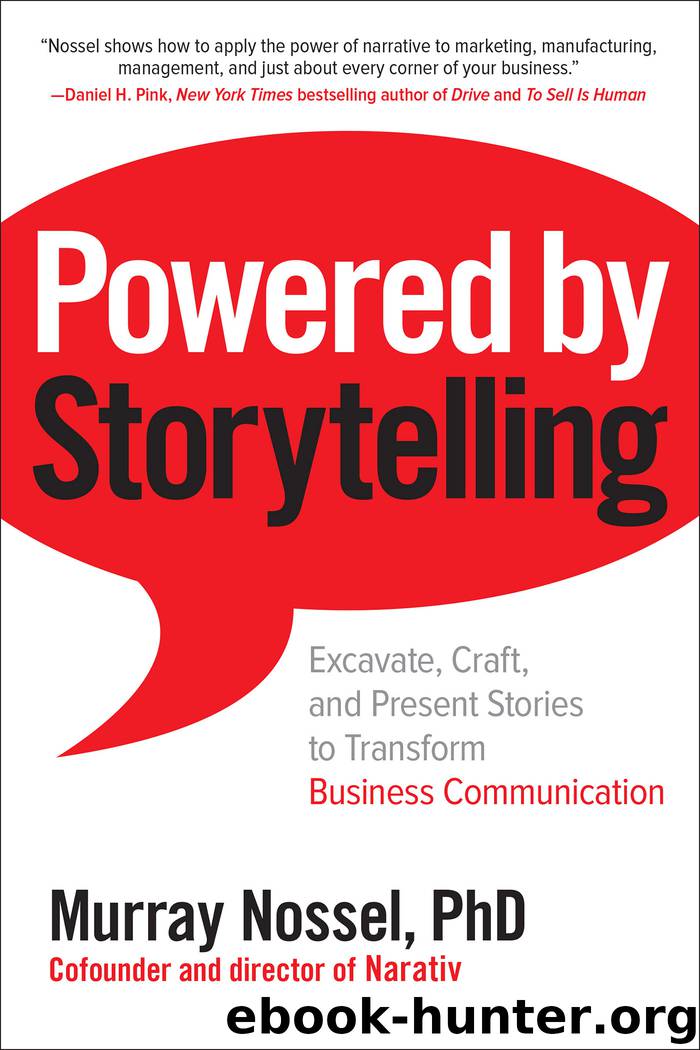Powered by Storytelling by Murray Nossel

Author:Murray Nossel
Language: eng
Format: epub
Publisher: McGraw-Hill Education
Published: 2018-04-27T04:00:00+00:00
THE GROUND RULES
Our workshop instructions continued:
You will have three minutes to present yourself as your grandparent. Speak in the first person “I” point of view, tell us your name, and somewhere in the course of the story, tell us when you were born and whether you are currently alive or have died. If you have died, please tell us when.
Please remember that this exercise is really about listening. It is not about performance or delivery. It’s about the listening, which is the safe container for your story and which will also shape the story that you tell. You may think that you can prepare for this, but once you start speaking, the listening will take you in directions you cannot predict. In this group, you can speak anything. You will have three minutes each to tell your story. After three minutes, we will ring a bell and your time will be up. Remember, it is the listening that creates the telling.
At this point, participants are reminded to put away any pens or papers they may have. The timekeeper times each participant and rings the bell after three minutes. After each grandparent story is told, the teller is asked to give the story a name, and the facilitator writes the story title and the teller’s name on a flip chart.
The facilitator neither comments on the content of the story nor offers any suggestions for story improvement. The only comment made to the storyteller is a warm, genuine “Thank you.” After each story, the facilitator asks the group, “How was your listening? Were there any obstacles?”
People may respond, “I was thinking about my story,” or “I was thinking about how little I know about my grandparents.”
The facilitator acknowledges these obstacles by responding with, “You are now aware you have an obstacle because you have spoken it. You have acknowledged that it is there. Now let it go, hit the refresh button as you would on a computer, and bring yourself back to be fully present for the next story.”
The facilitator then moves on to the next person.
If some people appear to be distracted, the facilitator may specifically ask them to reflect on their obstacles to listening. If someone—the storyteller or any of the listeners—starts to cry or becomes emotional, that’s fine. There’s no need to comfort or coddle anyone. There’s no limit to how long or how frequent the post-story listening reflections should be. The facilitator’s job is to move the energy in the circle and make certain that everyone in the group understands the rules and feels safe.
After a while, the facilitator may decide to acknowledge the group’s listening and move on to the next story by saying, “Well done with the listening. Who is next?” If a story has been particularly emotional or painful, the facilitator can invite the group to take a collective breath as a way of letting go of the previous story and moving on to the next one. It is also important to acknowledge the group for the level of their listening and share that you think they are doing a good job of listening.
Download
This site does not store any files on its server. We only index and link to content provided by other sites. Please contact the content providers to delete copyright contents if any and email us, we'll remove relevant links or contents immediately.
Nudge - Improving Decisions about Health, Wealth, and Happiness by Thaler Sunstein(7709)
Deep Work by Cal Newport(7085)
Principles: Life and Work by Ray Dalio(6449)
The Doodle Revolution by Sunni Brown(4764)
Factfulness: Ten Reasons We're Wrong About the World – and Why Things Are Better Than You Think by Hans Rosling(4742)
Eat That Frog! by Brian Tracy(4541)
Thinking in Bets by Annie Duke(4227)
Hyperfocus by Chris Bailey(4119)
Visual Intelligence by Amy E. Herman(3783)
Writing Your Dissertation in Fifteen Minutes a Day by Joan Bolker(3730)
Ogilvy on Advertising by David Ogilvy(3622)
Hidden Persuasion: 33 psychological influence techniques in advertising by Marc Andrews & Matthijs van Leeuwen & Rick van Baaren(3566)
How to Win Friends and Influence People in the Digital Age by Dale Carnegie & Associates(3563)
How to win friends and influence people by Dale Carnegie(3474)
The Pixar Touch by David A. Price(3439)
Schaum's Quick Guide to Writing Great Short Stories by Margaret Lucke(3381)
Deep Work: Rules for Focused Success in a Distracted World by Cal Newport(3237)
Work Clean by Dan Charnas(3123)
The Slow Fix: Solve Problems, Work Smarter, and Live Better In a World Addicted to Speed by Carl Honore(3010)
